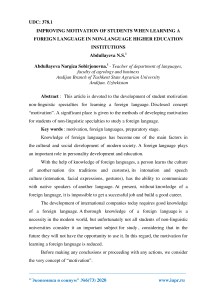Improving motivation of students when learning a foreign language in non-language higher education institutions
Автор: Abdullayeva N.S.
Журнал: Экономика и социум @ekonomika-socium
Рубрика: Основной раздел
Статья в выпуске: 6-1 (73), 2020 года.
Бесплатный доступ
This article is devoted to the development of student motivation non-linguistic specialties for learning a foreign language. Disclosed concept “motivation”. A significant place is given to the methods of developing motivation for students of non-linguistic specialties to study a foreign language.
Motivation, foreign languages, preparatory stage
Короткий адрес: https://sciup.org/140252386
IDR: 140252386 | УДК: 378.1
Текст научной статьи Improving motivation of students when learning a foreign language in non-language higher education institutions
Knowledge of foreign languages has become one of the main factors in the cultural and social development of modern society. A foreign language plays an important role in personality development and education.
With the help of knowledge of foreign languages, a person learns the culture of another nation (its traditions and customs), its intonation and speech culture (intonation, facial expressions, gestures), has the ability to communicate with native speakers of another language. At present, without knowledge of a foreign language, it is impossible to get a successful job and build a good career.
The development of international companies today requires good knowledge of a foreign language. A thorough knowledge of a foreign language is a necessity in the modern world, but unfortunately not all students of non-linguistic universities consider it an important subject for study , considering that in the future they will not have the opportunity to use it. In this regard, the motivation for learning a foreign language is reduced.
Before making any conclusions or proceeding with any actions, we consider the very concept of “motivation”.
“Motivation is an internal impulse to action, which determines the subjective and personal interest of an individual in its fulfillment”.
Intrinsic motivation is considered to be the driving force of amateur activity, Intrinsic motivation is considered to be the main condition for successful activity . Four characteristic manifestations of internal motivation of activity are distinguished:
External motivation can be a distant motivation, designed to achieve the final result of learning. Intrinsic motivation is close and relevant.
Education should be structured in such a way that students should experience a sense of satisfaction from the subject studied . For the development of motivation, students should set an exact goal for students to work on achieving it. It is very useful to focus on small tasks that can be easily completed. That is, in each lesson, when studying a topic, there should be a desire to achieve a result that will allow students to achieve success in their activities . To increase the motivation of students to learn a foreign language, in addition to traditional methods, G. Karnilova offers:
-
• use of additional sources of information (media, TCO, ICT, Internet);
-
• introduction of student project activities in the classroom;
-
• Introduction of a student rating system;
-
• Introduction of a system for publishing student successes and rewards for their in a hurry.
In order to motivate students to motivate learning, it is necessary to create a favorable psychological atmosphere in the classroom, mutual cooperation between students and the teacher, to attract and intensify their attention, to arouse interest, to form free activity and creativity of students. Motives and motivation are the driving force of the learning process and the assimilation of information and material. It offers the following pedagogical conditions for students of non-linguistic specialties that have a positive impact on the motivation for learning a foreign language:
-
a) the conditions affecting the formation of internal motivation - professional interest and, accordingly, awareness of the practical and theoretical significance of the knowledge gained for future professional activities (use in class of elements that mimic future professional activity, selection of informative and interesting texts / articles); taking into account the features of professional -psychological activity, the formation of research skills through the individualization of training;
-
b) the teacher (his personality , methodological literacy, orientation in the specialty that students receive, the teacher’s awareness of the goals that students set for themselves , studying a foreign language, sociability, openness, empathy, and nondirectivity of the organization of the process training); the emotional richness of classes, which contributes to a better assimilation of knowledge and is carried out through active teaching methods);
-
c) the conditions affecting the formation of external motivation: the creation of a situation of success, or the recognition of failure and its causes, the competitiveness of classes, the communicative orientation of classes.
The conditions discussed above can be created using various approaches that exist in the didactics of higher education.
Having made a conclusion, it can be concluded that in order to increase the motivation of students of non-linguistic universities when studying a foreign language, it is necessary to create conditions under which students will have a personal interest and need to learn a foreign language.
"Экономика и социум" №6(73) 2020
Список литературы Improving motivation of students when learning a foreign language in non-language higher education institutions
- Zaitseva S.E. Formation of motivation for learning a foreign language among students specialties. [Electronic resource] / S.E. Zaitseva //.
- Kornilova G.A. Increasing the motivation of students of technical specialties to study foreign language teacher / G.A.Kornilova // Methodical work, OTMESH.- 2014.- No. 13.
- The new philosophical encyclopedia: In 4 vols. M.: Thought. Edited by V. S. Styopin, 2001.
- G.T. Qodirova. Linguistic and communicative competence in learning language. International conference., 2016, p.441.
- N.A. Odilova., M.U. Irgashev. Information and communication technology in language learning. International conference., 2016, p.439.


